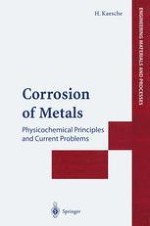2003 | OriginalPaper | Chapter
Corrosion Fatigue
Author : Prof. em. Dr. rer. nat. Helmut Kaesche
Published in: Corrosion of Metals
Publisher: Springer Berlin Heidelberg
Included in: Professional Book Archive
Activate our intelligent search to find suitable subject content or patents.
Select sections of text to find matching patents with Artificial Intelligence. powered by
Select sections of text to find additional relevant content using AI-assisted search. powered by
Fatigue, in general, is the loss in strength of structural materials caused by cyclic loads [1]. A possible dangerous outcome is fatigue crackings i.e. the initiation and propagation of quasi-brittle cracks under the influence of loads cycled with an amplitude, ∆σ = σmax − σmin, where σmax is lower than the static ultimate strength, Rm, of smooth samples, or else with an amplitude, ∆K = Kmax − Kmin, of the stress intensity factor, where Kmax is lower than the fracture toughness, Kc, of notched samples. Fatigue cracking is a widespread source of failure of structural materials. In contrast to stress corrosion cracking, it is a variant of ‘subcritical’ crack growth which does not primarily require simultaneous racktip corrosion processes. As long as it is not enhanced by an environment, it is not corrosion fatigue and, therefore not a problem of corrosion science but of metal physics. Also, corresponding to the prime importance of the subject, the expert literature collected in monographs, in meeting volumes, and in journals is huge and far beyond the scope of the present text.
